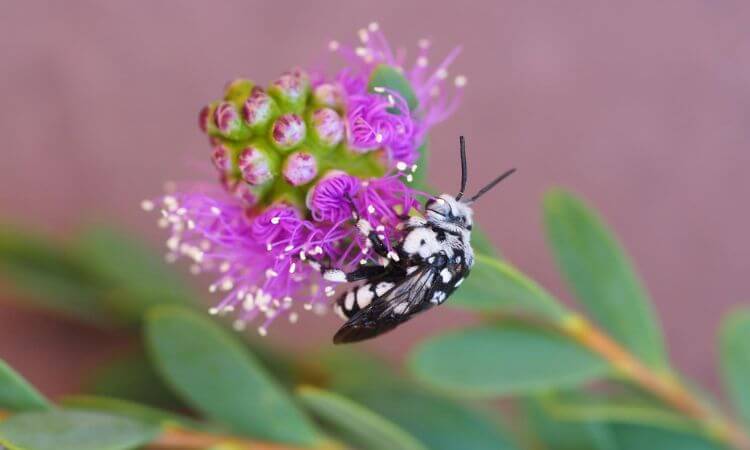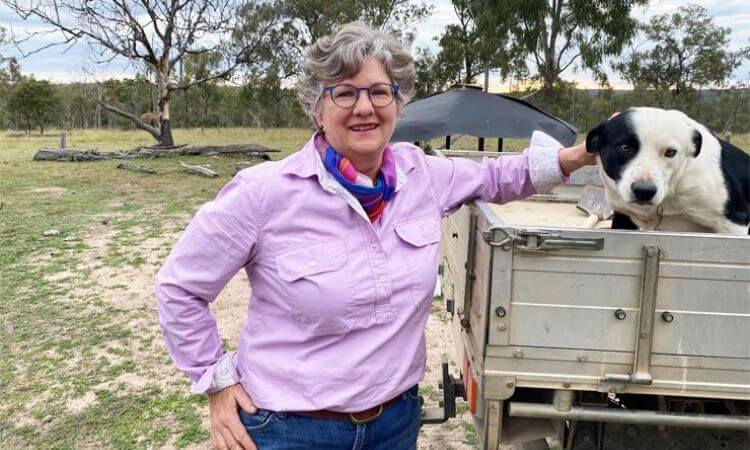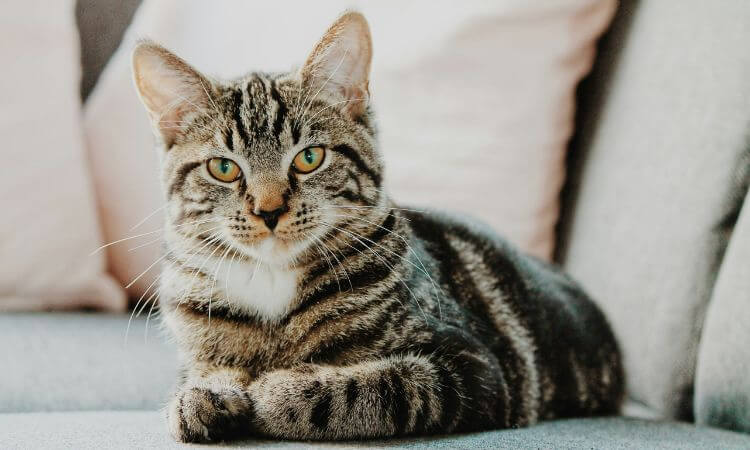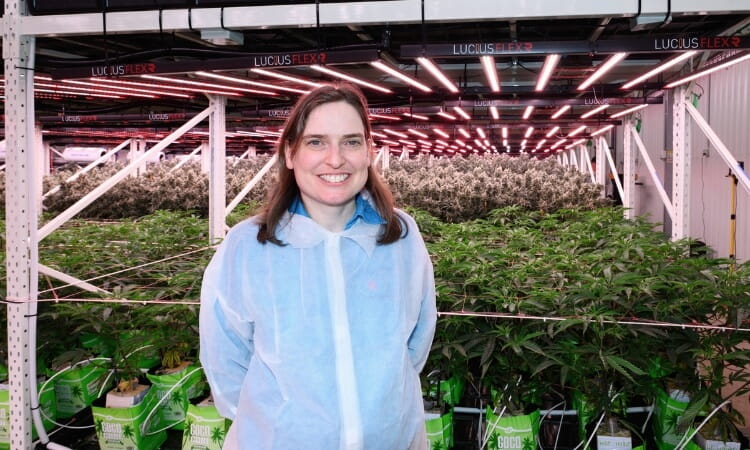Creating a buzz about National Science Week
3 min read
15 Aug 2024
Sophie Volker

National Science Week is officially underway, and the University of Southern Queensland (UniSQ) is excited to be putting this year’s theme into practice.
The theme for 2024 – Species Survival: More than just sustainability – aims to highlight the importance of science and innovation in ensuring the survival of different species in an ever-changing world.
UniSQ Centre for Sustainable Agricultural Systems Postdoctoral Research Fellow and native bee scientist Dr Kit Prendergast said more widespread knowledge was crucial to the survival of thousands of species of Indigenous bees across Australia.
“There are more than 1,660 described species of native bees in Australia – with hundreds more that are undescribed – and their biology and ecology are very different from the introduced European honey bee, who sadly gets all the limelight,” Dr Prendergast said.
“The first big challenge for Australia’s native bees is a lack of knowledge; there are almost no monitoring schemes, no assessments of their conservation status, or legislation to protect them or consider them in any environmental impact assessment.
“The leading threat to native bees is habitat loss; for example, livestock agriculture is contributing to the replacement of our native flowering vegetation by pasture. Other causes of habitat loss include large-scale cropping with exotic plants, mining and urbanisation.
“A major issue associated with habitat loss is loss of native vegetation, as many native bees rely exclusively on a limited subset of native flowers. You can have a garden full of flowers, but if they are all exotics, some native bees cannot survive.”
Dr Prendergast said other major challenges for native bees included climate change, overreliance on pesticides and toxins, and competition with the European honey bee.
“National Science Week gives scientists like me the chance to give a voice to our Indigenous bees and arm the community with evidence-based strategies to protect them,” Dr Prendergast said.
School of Agriculture and Environmental Science senior lecturer Dr Kathryn Reardon-Smith agreed National Science Week was important for educating people on the importance of conservation.
“Weeks such as National Science Week provide an opportunity to shine a light on issues, generate discussion and hopefully motivate positive commitment and action that will continue through time,” Dr Reardon-Smith said.
In addition to researching the value of seasonal climate forecasts in agricultural decision-making and co-designing models to enable climate risk management scenario testing, Dr Reardon-Smith is on the organising committee for the Australasian Plant Conservation Conference (APCC), coming to Toowoomba in October 2024.
Run by the Australian Network for Plant Conservation – the national network linking people, research and action in plant conservation – the conference will bring together plant conservation scientists, practitioners, agency staff, students and volunteers to discuss how science and innovative project work are addressing key threats to plant conservation.
“This year’s conference is the first time this event has been held in Queensland. It will explore the recovery of native plants after fire and other natural disasters, conservation of threatened species and communities, plant diseases such as Myrtle Rust and Phytophthora, and ways to build new and existing networks to conserve native flora and contribute to threatened plant recovery across the state,” Dr Reardon-Smith said.
Dr Reardon-Smith and Dr Prendergast said there were some simple steps everyone could take to ensure the survival of native flora and fauna species in Australia:
• Spend time in natural environments
• Be aware of spreading biosecurity risks such as weed seed and fungal spores
• Check clothing and clean walking shoes before and after visiting natural areas
• Be aware of weed risks when choosing garden plants and appropriately dispose of garden waste
• Leave patches of bare soil and trees in your garden
• Plant and retain native flowering plants, especially those in the Myrtaceae and Fabaceae families, and native buzz-pollinated flora
• Limit beekeeping, especially in backyards and native areas
• Do your part to mitigate climate change through reducing our carbon footprint
• Be curious – there’s a heap of biodiversity even in backyards
National Science Week runs from August 10-18, 2024.
Find out more about research at UniSQ’s Centre for Sustainable Agricultural Systems or School of Agriculture and Environmental Science.
The theme for 2024 – Species Survival: More than just sustainability – aims to highlight the importance of science and innovation in ensuring the survival of different species in an ever-changing world.
UniSQ Centre for Sustainable Agricultural Systems Postdoctoral Research Fellow and native bee scientist Dr Kit Prendergast said more widespread knowledge was crucial to the survival of thousands of species of Indigenous bees across Australia.
“There are more than 1,660 described species of native bees in Australia – with hundreds more that are undescribed – and their biology and ecology are very different from the introduced European honey bee, who sadly gets all the limelight,” Dr Prendergast said.
“The first big challenge for Australia’s native bees is a lack of knowledge; there are almost no monitoring schemes, no assessments of their conservation status, or legislation to protect them or consider them in any environmental impact assessment.
“The leading threat to native bees is habitat loss; for example, livestock agriculture is contributing to the replacement of our native flowering vegetation by pasture. Other causes of habitat loss include large-scale cropping with exotic plants, mining and urbanisation.
“A major issue associated with habitat loss is loss of native vegetation, as many native bees rely exclusively on a limited subset of native flowers. You can have a garden full of flowers, but if they are all exotics, some native bees cannot survive.”
Dr Prendergast said other major challenges for native bees included climate change, overreliance on pesticides and toxins, and competition with the European honey bee.
“National Science Week gives scientists like me the chance to give a voice to our Indigenous bees and arm the community with evidence-based strategies to protect them,” Dr Prendergast said.
School of Agriculture and Environmental Science senior lecturer Dr Kathryn Reardon-Smith agreed National Science Week was important for educating people on the importance of conservation.
“Weeks such as National Science Week provide an opportunity to shine a light on issues, generate discussion and hopefully motivate positive commitment and action that will continue through time,” Dr Reardon-Smith said.
In addition to researching the value of seasonal climate forecasts in agricultural decision-making and co-designing models to enable climate risk management scenario testing, Dr Reardon-Smith is on the organising committee for the Australasian Plant Conservation Conference (APCC), coming to Toowoomba in October 2024.
Run by the Australian Network for Plant Conservation – the national network linking people, research and action in plant conservation – the conference will bring together plant conservation scientists, practitioners, agency staff, students and volunteers to discuss how science and innovative project work are addressing key threats to plant conservation.
“This year’s conference is the first time this event has been held in Queensland. It will explore the recovery of native plants after fire and other natural disasters, conservation of threatened species and communities, plant diseases such as Myrtle Rust and Phytophthora, and ways to build new and existing networks to conserve native flora and contribute to threatened plant recovery across the state,” Dr Reardon-Smith said.
Dr Reardon-Smith and Dr Prendergast said there were some simple steps everyone could take to ensure the survival of native flora and fauna species in Australia:
• Spend time in natural environments
• Be aware of spreading biosecurity risks such as weed seed and fungal spores
• Check clothing and clean walking shoes before and after visiting natural areas
• Be aware of weed risks when choosing garden plants and appropriately dispose of garden waste
• Leave patches of bare soil and trees in your garden
• Plant and retain native flowering plants, especially those in the Myrtaceae and Fabaceae families, and native buzz-pollinated flora
• Limit beekeeping, especially in backyards and native areas
• Do your part to mitigate climate change through reducing our carbon footprint
• Be curious – there’s a heap of biodiversity even in backyards
National Science Week runs from August 10-18, 2024.
Find out more about research at UniSQ’s Centre for Sustainable Agricultural Systems or School of Agriculture and Environmental Science.
Related news
4 min read
14 Apr 2025
4 min read
8 Apr 2025
2 min read
2 Apr 2025


